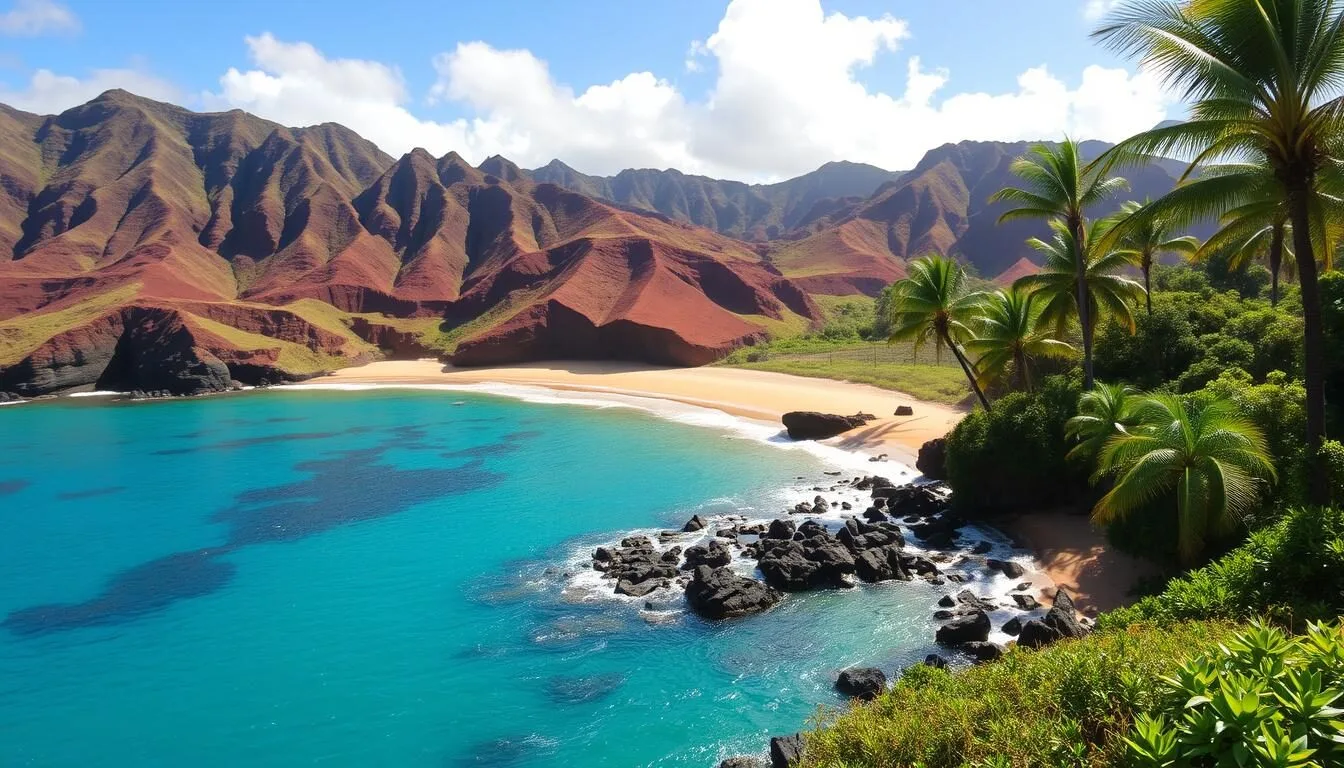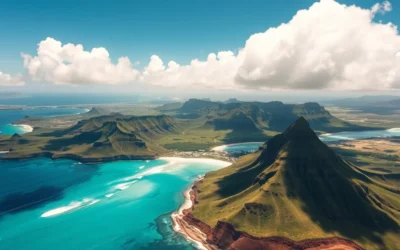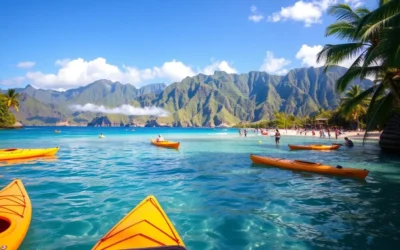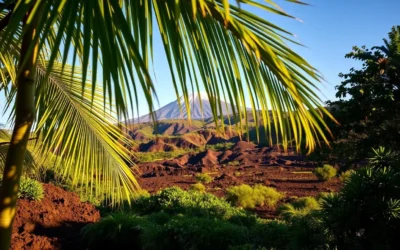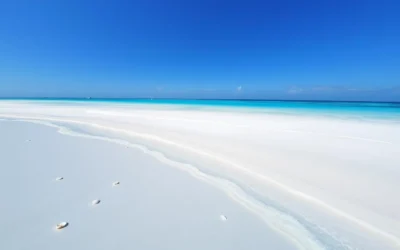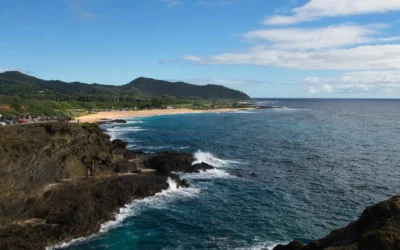✓ Accommodations ✓ Flights ✓ Rental Cars ✓ Tours & Activities
Imagine standing on a pristine white sand beach, surrounded by the tranquil atmosphere of a traditional Hawaiian landscape. Mākena State Park is a 164.4-acre wildland beach park that embodies the natural beauty of Maui, with its prominent cinder cone, Puʻu Ōlaʻi, and stunning beautiful beaches.
As you explore this state park, you’ll discover a haven for outdoor enthusiasts and those seeking a serene escape. With its rich history and breathtaking landscapes, Mākena State Park is a must-visit destination for anyone traveling to Maui.
Discovering Mākena State Park: An Overview
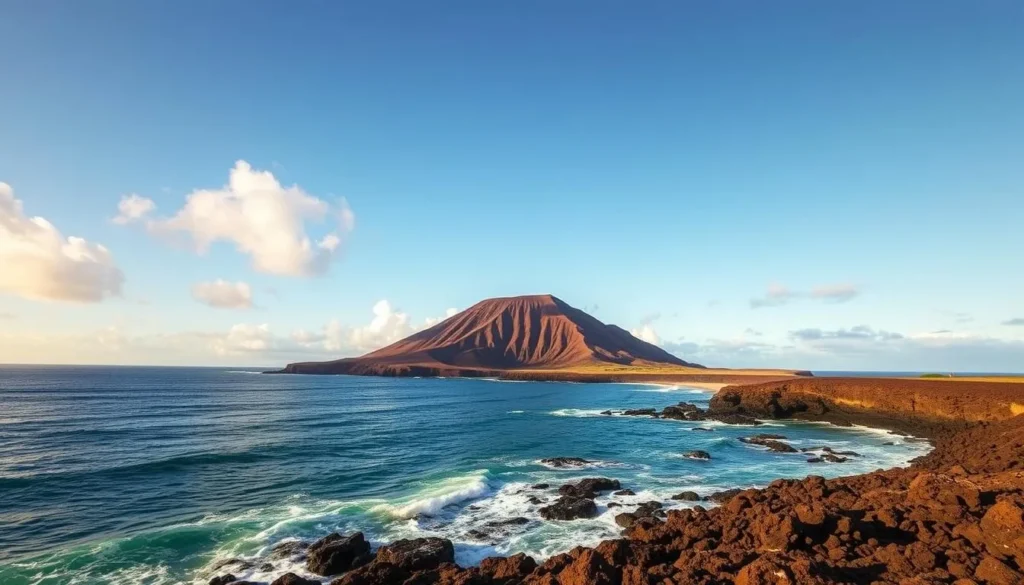
With its untouched coastline and rich cultural heritage, Mākena State Park is a must-visit destination on Maui. This scenic wildland beach park is characterized by the prominent Pu’u Ola’i cinder cone and a large white sand beach, spanning 164.4 acres.
Location and Geography
Mākena State Park is situated on Maui’s southwestern shore, offering some of the island’s most pristine and undeveloped coastline. The park’s most distinctive geographical feature is Puʻu Ōlaʻi, a 360-foot cinder cone formed during one of Maui’s last volcanic eruptions.
Cultural and Historical Significance
This area holds deep cultural significance for Native Hawaiians, with archaeological evidence suggesting human presence dating back centuries. Traditional Hawaiian practices and ceremonies have historical connections to this land, making it a place of cultural heritage.
Planning Your Visit to Mākena State Park
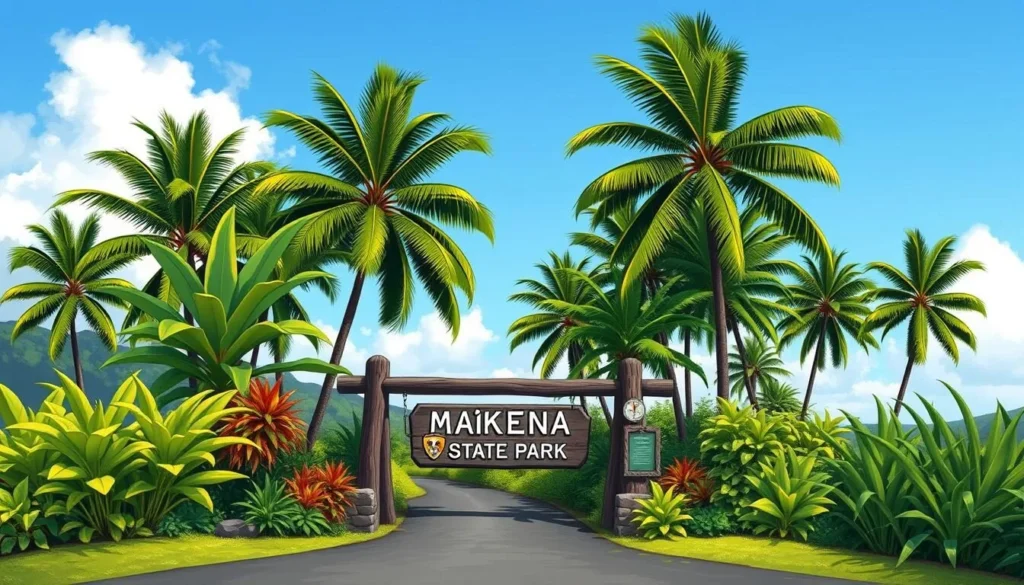
Getting ready for your visit to Mākena State Park involves understanding the park’s hours, fees, and best times to visit. To make the most of your trip, it’s crucial to be aware of the operating hours, entrance fees, and parking costs.
Operating Hours
Mākena State Park operates daily from 5:00 am to 7:00 pm for most areas. However, Puʻu Ōlaʻi (Little Beach) closes earlier at 4:00 pm on weekends. It’s essential to plan your day accordingly to enjoy the park’s facilities without any time constraints.
Entrance and Parking Fees
When planning your visit, be aware that entrance fees apply for non-Hawaii residents at $5 per person, while Hawaii residents can enter free with a valid driver’s license or state ID. Parking at the park costs $10 per vehicle for non-residents, while Hawaii residents park for free with proper identification.
Best Time to Visit
The parking lot fills quickly, especially on weekends and holidays, so arriving early (before 9 am) is highly recommended. The best months to visit are April-May and September-October when you’ll find fewer tourists and pleasant weather. Visiting during these periods ensures a more relaxed experience at Mākena State Park.
The Beaches of Mākena State Park
With its picturesque coastline, Mākena State Park boasts some of Maui’s most beautiful beaches. The park is home to three distinct beaches, each offering a unique experience for visitors.
Oneloa (Big Beach): The Crown Jewel
Oneloa Beach, also known as Big Beach, is the crown jewel of Mākena State Park. It stretches for a mile and a half with golden sands that span 100 feet in width, making it one of Maui’s largest and most impressive beaches. However, the powerful shore break can be dangerous for inexperienced swimmers, so it’s crucial to check with lifeguards about conditions before entering the water.
Puʻu Ōlaʻi (Little Beach): The Hidden Gem
Just over the northern lava outcropping lies Puʻu Ōlaʻi Beach, or Little Beach, a smaller, more secluded cove accessible via a short climb over the rocky promontory separating it from Big Beach. Little Beach is known for its more liberal atmosphere and is unofficially a clothing-optional beach.
Oneuli (Black Sand Beach): Volcanic Beauty
Oneuli Beach, or Black Sand Beach, offers a dramatic contrast with its dark volcanic sand, created by the erosion of lava rock. It’s located near the base of Puʻu Ōlaʻi cinder cone and provides unique snorkeling opportunities with its rocky underwater terrain attracting diverse marine life.
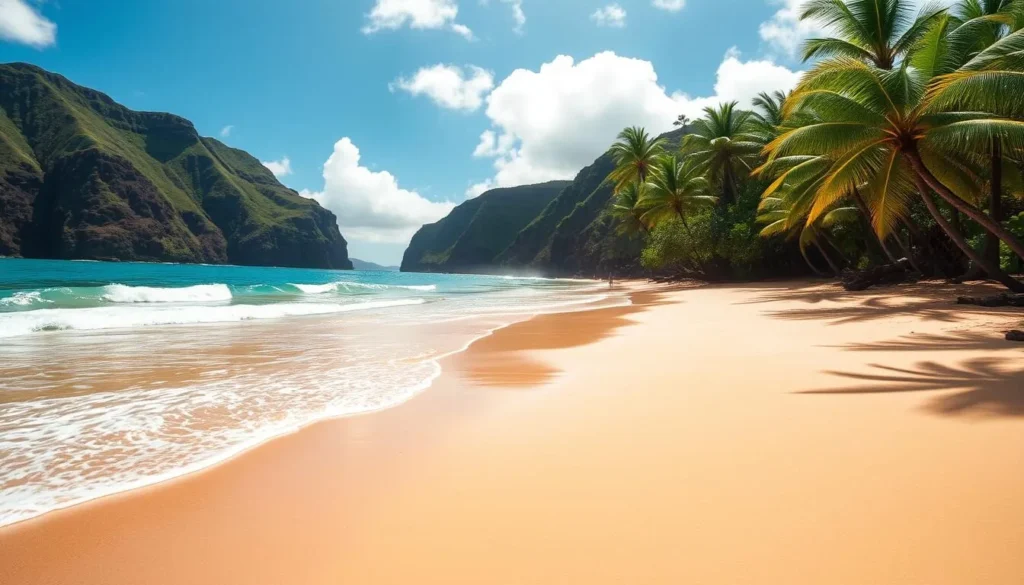
Hiking Trails at Mākena State Park

Explore the natural beauty of Mākena State Park through its scenic hiking trails. The park offers two distinct trails that showcase its unique landscapes and volcanic origins.
Puʻu Ōlaʻi Cinder Cone Trail
The Puʻu Ōlaʻi Cinder Cone Trail is a moderately challenging 1.5-mile round-trip hike with 360 feet of elevation gain. You’ll need to start near Oneuli Black Sand Beach, as the western approach has been closed due to erosion and safety concerns. Watch for Kiawe tree thorns along the narrow trail as you make your way to the summit of this volcanic cinder cone.
The trail rewards you with panoramic views of South Maui’s coastline, neighboring islands, and the dramatic landscape below.
Coastal Trail Below the Cliffs
The Coastal Trail below the cliffs provides a more accessible 2-mile round-trip hike with 275 feet of elevation gain. This trail follows the shoreline from Big Beach past Little Beach and continues along the rugged lava coastline, offering stunning views of the ocean and offshore islands.
You’ll likely enjoy solitude once you pass Little Beach, making this trail a great option for those seeking a more secluded experience.
Water Activities and Recreation
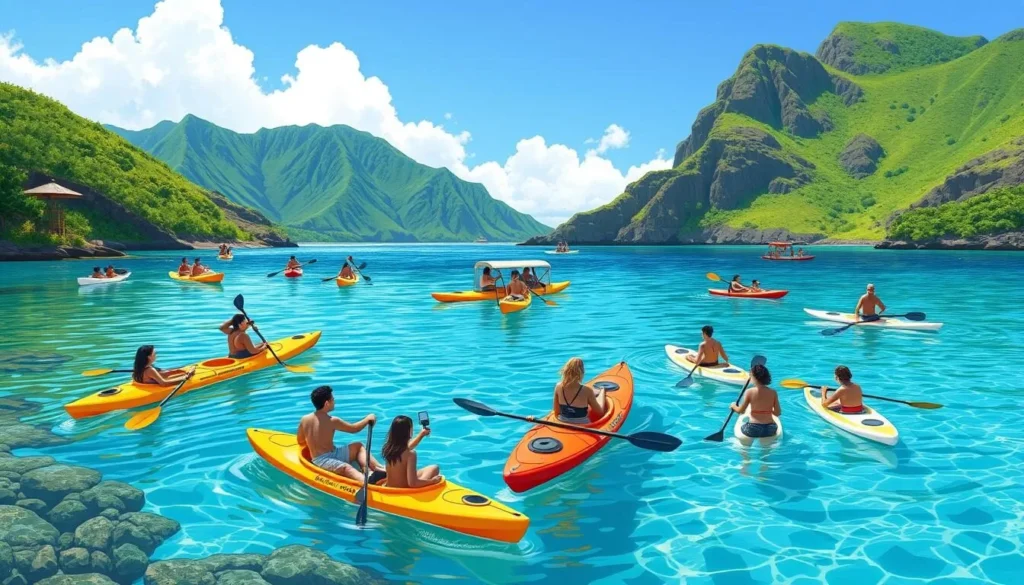
Mākena State Park offers a variety of water activities that cater to different interests and skill levels. The park’s diverse beaches provide a range of opportunities for water enthusiasts to enjoy their favorite activities.
Swimming and Snorkeling Conditions
Swimming is best during calm seas, typically in the morning hours before the trade winds pick up. Oneloa (Big Beach) offers the most accessible swimming when conditions are favorable. However, be cautious of the powerful shore breaks at Big Beach, which can create dangerous conditions. Snorkeling is best at Oneuli (Black Sand Beach) and around the rocky outcroppings at the north end of Big Beach.
Surfing and Bodyboarding
Surfing and bodyboarding are popular at Big Beach when conditions are right, but the strong currents and shore breaks make these activities suitable only for experienced water sports enthusiasts. Always check with lifeguards about current conditions and heed warning signs.
Safety Information for Visitors
Safety is paramount at Mākena State Park, where the natural beauty of the beaches can sometimes mask significant dangers. Visitors should be aware of the potential hazards to ensure a safe and enjoyable experience.
Understanding Shore Breaks and Currents
Mākena State Park’s beaches are known for their powerful shore breaks and strong currents. Shore breaks can be particularly dangerous, as waves build up energy offshore before breaking directly onto the steep beach slope, potentially causing serious injuries. If caught in a rip current, it’s essential to swim parallel to the shore until you’re out of the current before attempting to swim back to the beach.
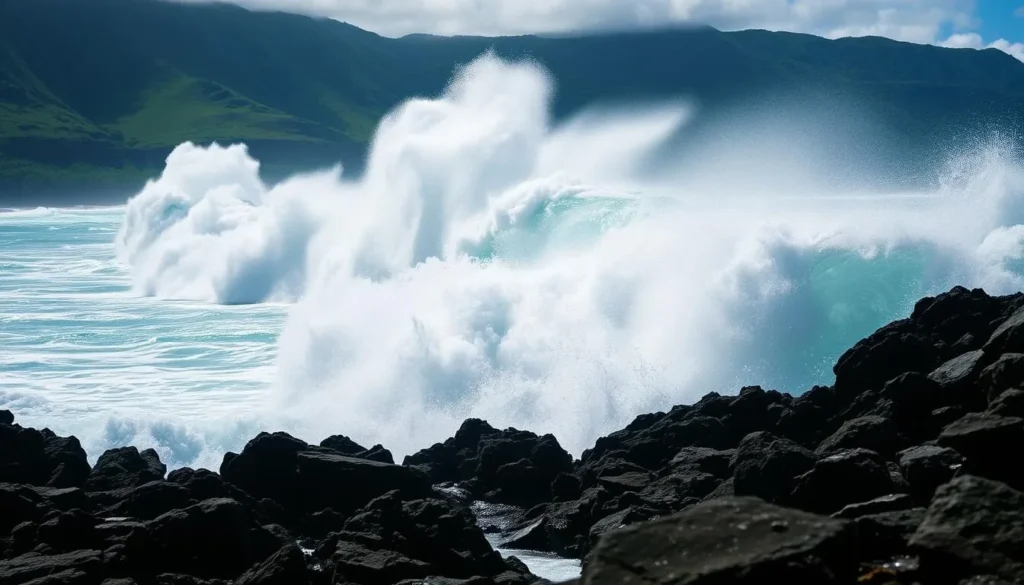
Lifeguard Services and Warning Signs
Lifeguards are stationed at Big Beach daily from 8 am to 4:45 pm. They should be your first stop for current condition information. Always check with them before entering the water and swim in designated areas. Pay close attention to warning flags and signs throughout the park: red flags indicate dangerous conditions, while yellow flags signal caution is needed.
| Flag Color | Condition |
|---|---|
| Red | Dangerous conditions; swimming not advised |
| Yellow | Caution needed |
Facilities and Amenities at Mākena State Park
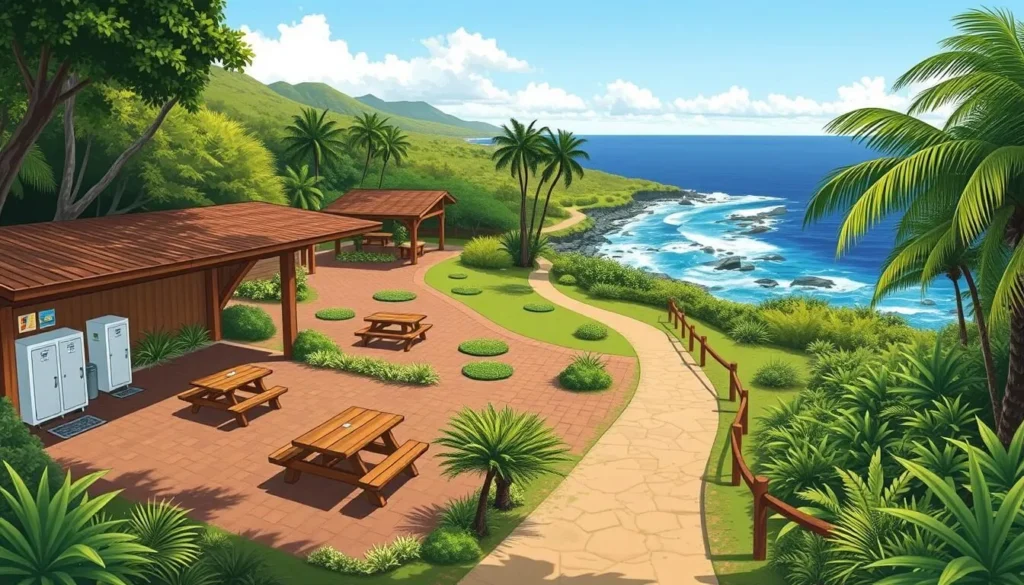
When visiting Mākena State Park, you’ll find limited but essential amenities to support your beach day. The park offers basic facilities, though amenities are limited compared to more developed beach parks on Maui.
Restrooms and Changing Areas
Restroom facilities consist of portable toilets located in the main parking areas. There are no permanent restroom buildings or changing rooms available within the park boundaries.
Food Options and Concessions
A mobile food truck concession operates in the parking area, offering refreshments and light meals. The selection may be limited, and hours can vary seasonally.
What to Bring With You
It’s essential to bring your own water supply, as there is no drinking water available in the park. Pack essentials like sun protection, beach chairs, snacks, and plenty of water. Consider bringing snorkeling gear, boogie boards, or other beach equipment, as there are no rental facilities within the park.
Transportation and Parking Tips
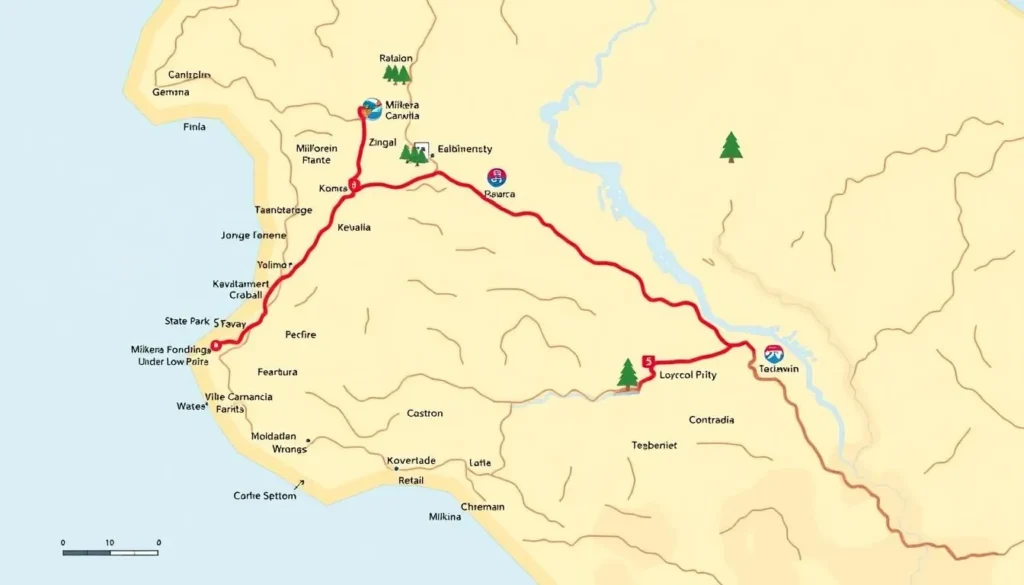
Planning your trip to Mākena State Park involves a simple drive down Highway 31, turning onto Wailea Ike Drive, and following the signs. To get to the park, you’ll need to navigate through the scenic roads of South Maui.
Driving Directions
From Kihei, take Highway 31 south until it ends. Turn right onto Wailea Ike Drive, then quickly left onto Wailea Alanui Drive, which becomes Makena Alanui Road. Continue on this road past several resorts and golf courses until you see signs for Mākena State Park on your right. The drive takes approximately 25-30 minutes from central Kihei.
Parking Strategies
The main parking lot at Mākena State Park fills quickly, especially on weekends and holidays. To secure a spot, arrive before 9 am. Parking fees can be paid at kiosks or online. If the lot is full, consider visiting nearby Maluaka Beach or returning later. Parking illegally along the road should be avoided as tickets are frequently issued and cars may be towed.
Nearby Attractions and Day Trip Ideas
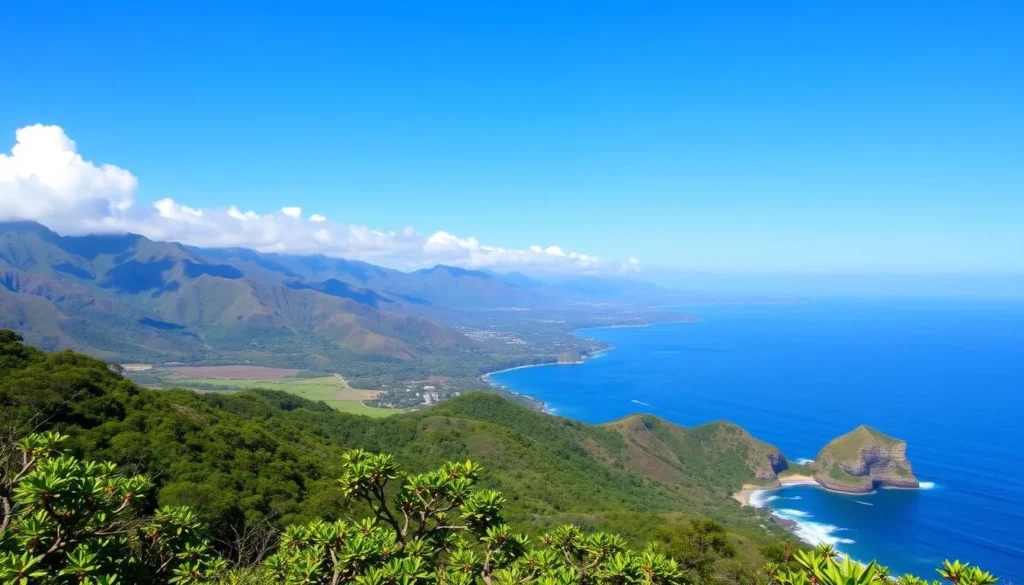
Mākena State Park is just the starting point for your Maui adventure, with numerous nearby attractions to discover. The surrounding South Maui area offers a rich blend of natural beauty, cultural experiences, and recreational activities that complement your visit to this stunning state park.
ʻAhihi-Kinaʻu Natural Area Reserve
Just south of Mākena State Park lies the ʻAhihi-Kinaʻu Natural Area Reserve, a protected area that encompasses 2,045 acres of marine ecosystem and recent lava flows. This reserve is a haven for snorkeling, with protected coves offering some of Maui’s best underwater experiences. When visiting, be sure to respect the area’s protected status by staying on designated trails, using reef-safe sunscreen, and avoiding contact with coral formations.
South Maui Highlights
La Perouse Bay, located at the end of the road past the ʻAhihi-Kinaʻu Reserve, features dramatic lava fields from Haleakalā’s last eruption in 1790, providing a unique glimpse into the geological history of the Hawaiian islands. North of Mākena, Wailea Beach and Polo Beach offer more manicured beach experiences, complete with facilities, restaurants, and water sports rentals. For a cultural experience, visit the historic Keawala’i Congregational Church, built in 1832 from lava rock and coral mortar, which offers stunning ocean views and insights into Hawaii’s missionary period.
By combining your visit to Mākena State Park with these nearby attractions, you can enjoy a well-rounded and memorable Maui experience.
Conclusion: Making the Most of Your Mākena State Park Visit
Your visit to Mākena State Park can be a memorable experience with some planning and awareness. To make the most of your trip, arrive early to secure parking and enjoy calmer waters. Always check with lifeguards about shore breaks and strong currents to ensure your safety.
Bring everything you need, including water, sun protection, and beach gear, as facilities are limited. Consider visiting on weekdays for a more peaceful experience. Take time to explore the park’s hiking trails and less-visited areas for a more rewarding experience.
By being mindful of your surroundings and taking necessary precautions, you’ll create lasting memories of this beautiful beach park on Maui.
The above is subject to change.
Check back often to TRAVEL.COM for the latest travel tips and deals.
